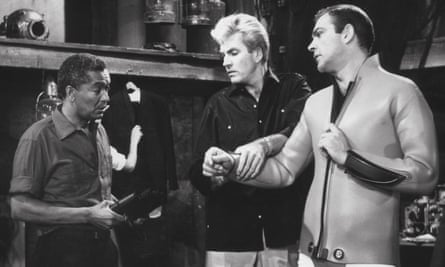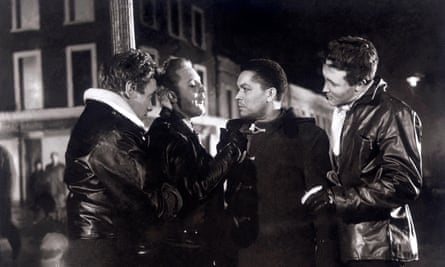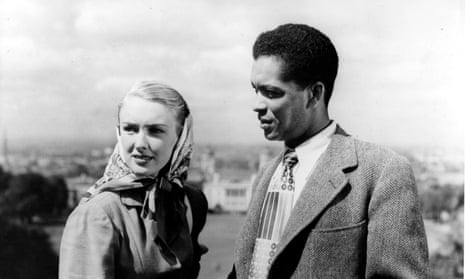‘Not long till your birthday!” the receptionist shouts as Earl Cameron materialises in the lobby of the Holiday Inn near his home in Warwickshire. He’s come with his wife, Barbara, to check on the party arrangements. They’ve booked the conference suite, which he now fears is too small, given all the guests who are coming. He has six children scattered around the world, more grandkids than he can keep track of, plus scores of old friends.
It’s going to be a big bash, which is only fitting. Cameron was arguably Britain’s first black movie star – and these are the preparations for his 100th birthday, which takes place this week.
He thinks that by rights he should have gone long ago. In 1940, he came down with pneumonia and was abandoned in the corner of a hospital ward. This was just after Dunkirk and the beds were full of wounded soldiers, who bet on how long it would take him to die. Just recently, he went for a check-up and was told the pneumonia had basically destroyed his left lung. The thought amuses him: “All these years on just one lung.”

In his time, he’s been a merchant seaman, a hotel dishwasher and an ice-cream salesman. Mostly, though, he has worked as an actor. He’s appeared in Ealing dramas, a James Bond movie and played a wily dictator in Sidney Pollack’s The Interpreter. But if Cameron never quite achieved leading-man status, that was hardly his fault – there were other factors at play. One might describe him as the best black British actor of his generation, which is another way of saying that he stood alone at the top, waiting for others to climb up and join him.
“I never saw myself as a pioneer,” he says. “It was only later, looking back, that it occurred to me that I was.” In person, he wears the years lightly, balancing himself with a cane as he crosses to the table. He orders a pot of green tea and attempts to boil 100 years down to 90 minutes. “Do stop me if I’m boring you,” he says, “or I’ll just go on and on.”
He recounts how he first landed in the UK from Bermuda in October 1939, weeks into the war. He talks about how difficult it was for a black man to find work. But out of the blue, theatre threw him a lifeline. A gap had appeared in the chorus line of Chu Chin Chow – a musical comedy based on Ali Baba – and Cameron got the gig. At the time he was washing dishes in a cafe on the Strand. The life of a travelling player was rather more to his taste.

“In theatre, there was no particular colour bar,” he says. “It was only when we went on tour that I met with prejudice, because we would generally just arrive in town on the day and then go look for digs. I remember this one particular Sunday in Dudley, I believe. I rang the bell and this landlady came to the door, took one look at me and then – bam! Slammed the door in my face, barely missed my nose.” He laughs. “The stupidity of it all. I like to think I rise above it. I never got bitter. Many black actors did.”
In hindsight, perhaps, he peaked too early. He broke the mould on his very first film. Shot in 1951, Basil Dearden’s thriller Pool of London cast him as Johnny, a young sailor who battles racists at the docks and romances a white girl beside Greenwich Observatory. It was a part that dovetailed neatly with Cameron’s own experience as a former seaman married to a white British woman, and his performance is heartfelt and nuanced, building towards tragedy. “First British film to show a mixed-race relationship,” he says with a shrug. “But it felt natural to me. It felt like real life.”
Sapphire, another Dearden collaboration, investigates the case of a pregnant woman found stabbed to death on Hampstead Heath. This time Cameron plays the woman’s doctor brother, who proves the key to unlocking the mystery. The actor casts his mind back. “Pool of London,” he says. “Sapphire. Guns at Batasi. Flame in the Streets. Those were good films, nice parts. But I also got small parts, bread-and-butter parts. I forget the names of most of them now.”
It was remarkable that Cameron found paid acting work at all, still more so that he was able to pluck such meaty roles from the era’s thin gruel of racial stereotypes. But his success came with in-built limitations. Producers, it transpired, were prepared to use him as a fascinating sideline, or to provide their tale with a tough political subtext. But most balked at letting him carry a film on his own.
He nods. “No doubt about it. Unless it was specified that this was a part for a black actor, they would never consider a black actor for the part. And they would never consider changing a white part to a black part. So that was my problem. I got mostly small parts, and that was extremely frustrating – not just for me but for other black actors. We had a very hard time getting worthwhile roles.”
The answer, for him, lay outside the British film industry. By the mid-1960s, Cameron was playing Sean Connery’s Caribbean sidekick in Thunderball and cropping up in episodes of Doctor Who and The Prisoner. But he had also become deeply involved with the Baha’i faith – a belief system concerned with the oneness of God and the harmony of humanity – and was keen to spread the word.

So he moved out to the Solomon Islands, helped established a Baha’i centre and ran an ice-cream shop on the side. He liked the life and enjoyed running a business. All being well, he would still be there now – except that Audrey, his first wife, fell ill and then died. “This was 1993, 1994.” He clears his throat, throws up his hands. “There we are,” he says. “That’s life.”
Cameron moved back to the UK, eventually remarried, and – incredibly, given he was now in his 80s – returned to acting. Look closely and you can spot him in The Interpreter, The Queen, and playing alongside Leonardo DiCaprio in Christopher Nolan’s Inception. “Well, it was the only thing I knew how to do,” he chuckles. “I always had some talent as an actor. And I’m not convinced I’ve retired yet.”
Are there more opportunities for black British performers today? Cameron has his doubts. “Still not enough good parts. But more good actors. Like the guy in A United Kingdom [David Oyelowo]. He’s a brilliant actor – he played Martin Luther King as well. Also, the one in 12 Years a Slave [Chiwetel Ejiofor]. Another brilliant actor. I’m not sure I could cope with those guys. The competition would be a lot keener. Back then, I was one of the only really good black actors.”
At the Holiday Inn, Barbara has completed her rounds; the party preparations are safely in hand. There’s a whole century to be celebrated, 125 guests to find room for. And yes, Cameron is looking forward to it, although he’s not the sort to celebrate himself. “I haven’t lived a good life,” he says. “I used to be a regular drinker – but I gave that up when I became a Baha’i. And I have to be honest, I’ve finally reached the stage in my life when I don’t have to take a second look at an attractive girl. And that has been a weakness. So I’ve made a lot of mistakes. A lot of things I’d have done different, if I’d only been wiser.”
It’s a warm summer’s day and Cameron decides that he and Barbara might as well walk on into town. They can see the shops, stop off at a cafe. The actor says goodbye and makes his exit. Driving down the high street, I notice the couple again. They’re already 200 yards out, moving at a clip, Cameron swinging his cane. The sun is in his white hair. He’s come a long way on just the one lung.

Comments (…)
Sign in or create your Guardian account to join the discussion